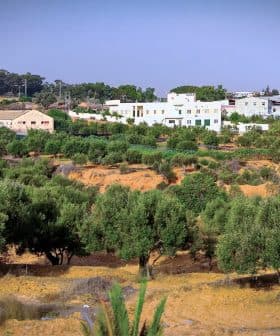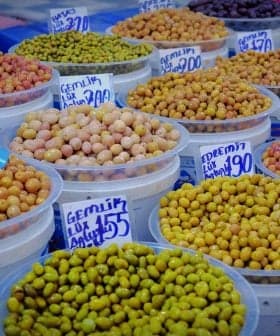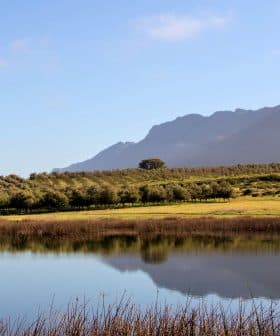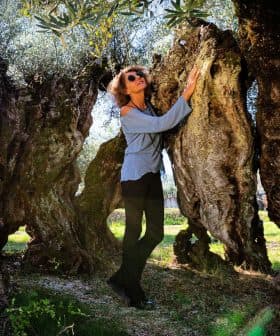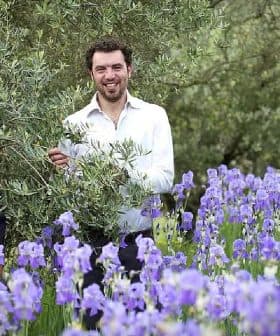Precision in Every Step: Inside an Award-Winning Producer’s Methodical Approach
Harvesting and milling with surgical precision is paramount at Hellenic Fields, which celebrated a sixth-straight award-winning performance at the 2025 NYIOOC.
 The harvest at Hellenic Fields in the mountainous near Olympia (Photo: Hellenic Fields)
The harvest at Hellenic Fields in the mountainous near Olympia (Photo: Hellenic Fields) Hellenic Fields, founded in 2012 by Nikolas Philippidis and Yiorgos Moforis, produces high-quality olive oil using a one-by-one philosophy, leading to international recognition and awards. The company’s Ena Ena brand, crafted from Koroneiki olives in the western Peloponnese, has won multiple Gold Awards at the NYIOOC World Olive Oil Competition for its superior quality and organic production methods.
The deep desire of two friends, Nikolas Philippidis and Yiorgos Moforis, to bring authentic Greek flavors to people’s tables led to the creation of Hellenic Fields in 2012.
“Our company was born out of our love, appreciation and respect for the exceptional treasures of the Greek land,” the two founders and owners told Olive Oil Times.
The philosophy of Hellenic Fields in olive oil production is reflected in its brand, Ena Ena, which translates to “one by one,” highlighting the thoroughness with which all production operations are completed.
We know and nurture our plants ena-ena, one by one, monitor their flowering and witness their fruition throughout the year.
“We are farmers and producers of our extra virgin olive oil, organic herbs and honey,” Philippidis and Moforis said.
“We are personally engaged in every production stage, from cultivation to packaging, as active workers and watchful overseers,” they added. “This allows us to ensure the superior quality of our products and the preservation of the pristine land we own and cultivate.”
Hellenic Fields has been in business for just over a decade. Nevertheless, the meticulous production of top-tier extra virgin olive oil has brought the company to the world stage, winning a Gold Award at the 2020 NYIOOC World Olive Oil Competition and in every subsequent edition of the NYIOOC.
See Also:Producer Profiles“The NYIOOC awards we have won over the years validate the high quality of our olive oil and further solidify our corporate identity,” Philippidis and Moforis said, hailing six straight years of success in New York.
Hellenic Fields has relied on its topline olive oil, the Ena Ena Superior Organic Olympia, to claim the coveted awards.
Ena Ena, which also carries a Protected Geographical Indication (PGI) certification to denote its place of origin, is crafted from early-harvested Koroneiki olives grown in the village of Ancient Skyllountia, close to Olympia in the western Peloponnese.
The company describes Ena Ena olive oil as having a vivid green color, with unique fruity and freshly cut grass aromas, and a pleasantly bitter taste with a long-lasting aftertaste.
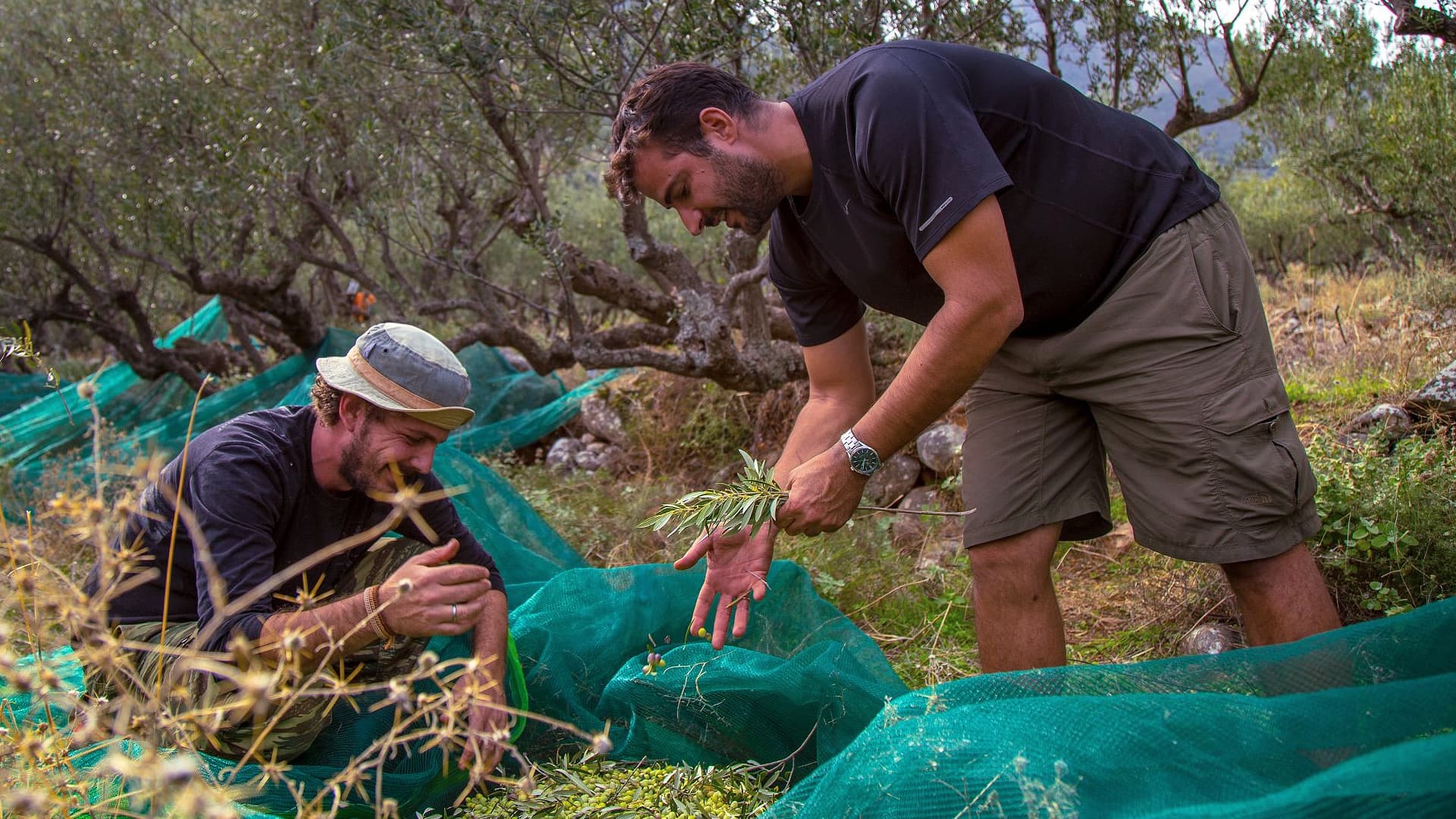
Nikolas Phlippidis and Yiorgos Moforis co-founded Hellenic Fields in 2012. (Photo: Hellenic Fields)
“It also holds a high ranking in polyphenols, those miraculous natural antioxidants found in high-quality olive oils,” Philippidis and Moforis noted.
Friends since childhood, Philippidis and Moforis decided to professionally involve themselves in the production of extra virgin olive oil, tapping into the potential of their native lands.
“We found that the unique terroir of our homelands, Ancient Olympia in western Peloponnese and Mani in the southern Laconia region, can foster the production of high-quality olive oil,” they said.
The two farmers also stayed loyal to their one-by-one philosophy from the outset, vertically integrating all production stages.
From harvesting olives in their olive groves to processing them at their privately owned mill and bottling the fresh olive oil at their bottling facility, they carefully assemble all the pieces of the production process, putting their stamp on each one.
The olive oils of Hellenic Fields are produced from Koroneiki olive trees, which are aged between five and 200 years, grown on the Peloponnese Peninsula. The company’s groves are kept organic and traditional, also preserving the local ecosystem.
“We know and nurture our plants ena-ena (one by one), monitor their flowering and witness their fruition throughout the year,” the owners said.
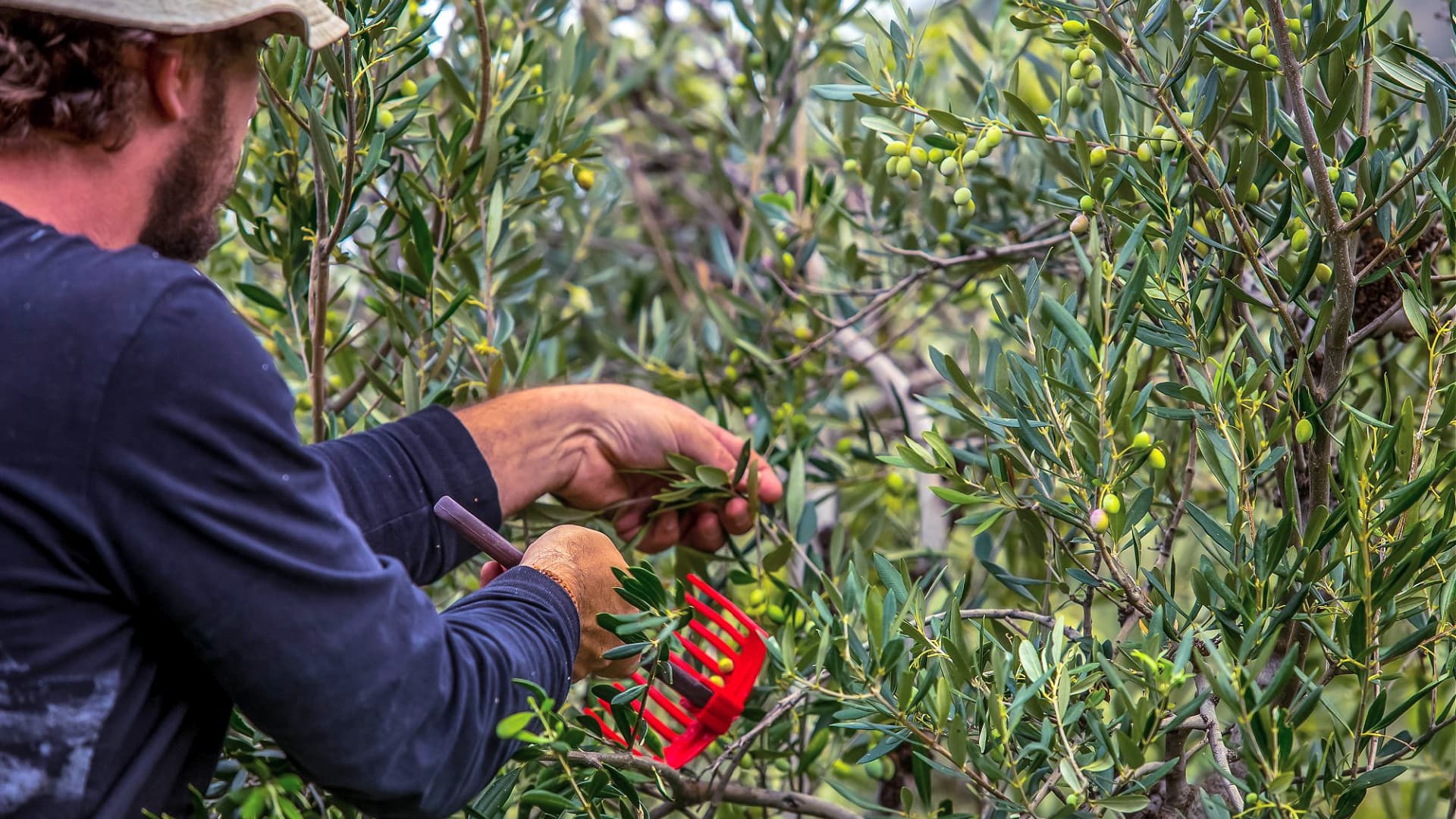
Harvesting rakes are used at Hellenic Fields to minimize damage on olives. (Photo: Hellenic Fields)
“Our groves thrive in harmony with the local ecosystem,” they added. “Oregano, thyme and other native herbs grow naturally among our olive trees, enriching the land and enhancing the aromatic complexity of our olive oils.”
They also apply sustainable and strictly organic farming methods, entirely free of chemicals and pesticides. Part of their organic cultivation involves reusing branches and leaves that remain from the harvest and from pruning the trees.
“We make compost of the olive leaves, used as an organic fertilizer to give our trees the necessary nutrients,” Philippidis and Moforis said. “As such, we safeguard the vitality of our groves, maintaining and protecting the characteristics of the microclimate and agricultural landscape without using chemical pesticides or fertilizers.”
Pruning is another essential part of the care given to the trees of Hellenic Fields.
“Pruning prolongs the productive period of the olive trees, facilitates harvesting and saves soil water,” Philippidis and Moforis said. “By improving the air circulation among the branches and exposing them to more sunlight, we enhance growth healthily and productively and, at the same time, control infestations from pests in a natural way and protect our olive trees from diseases.”
All the care the owners of Hellenic Fields offer to their olive trees throughout the year culminates when the harvest begins in late October each year.
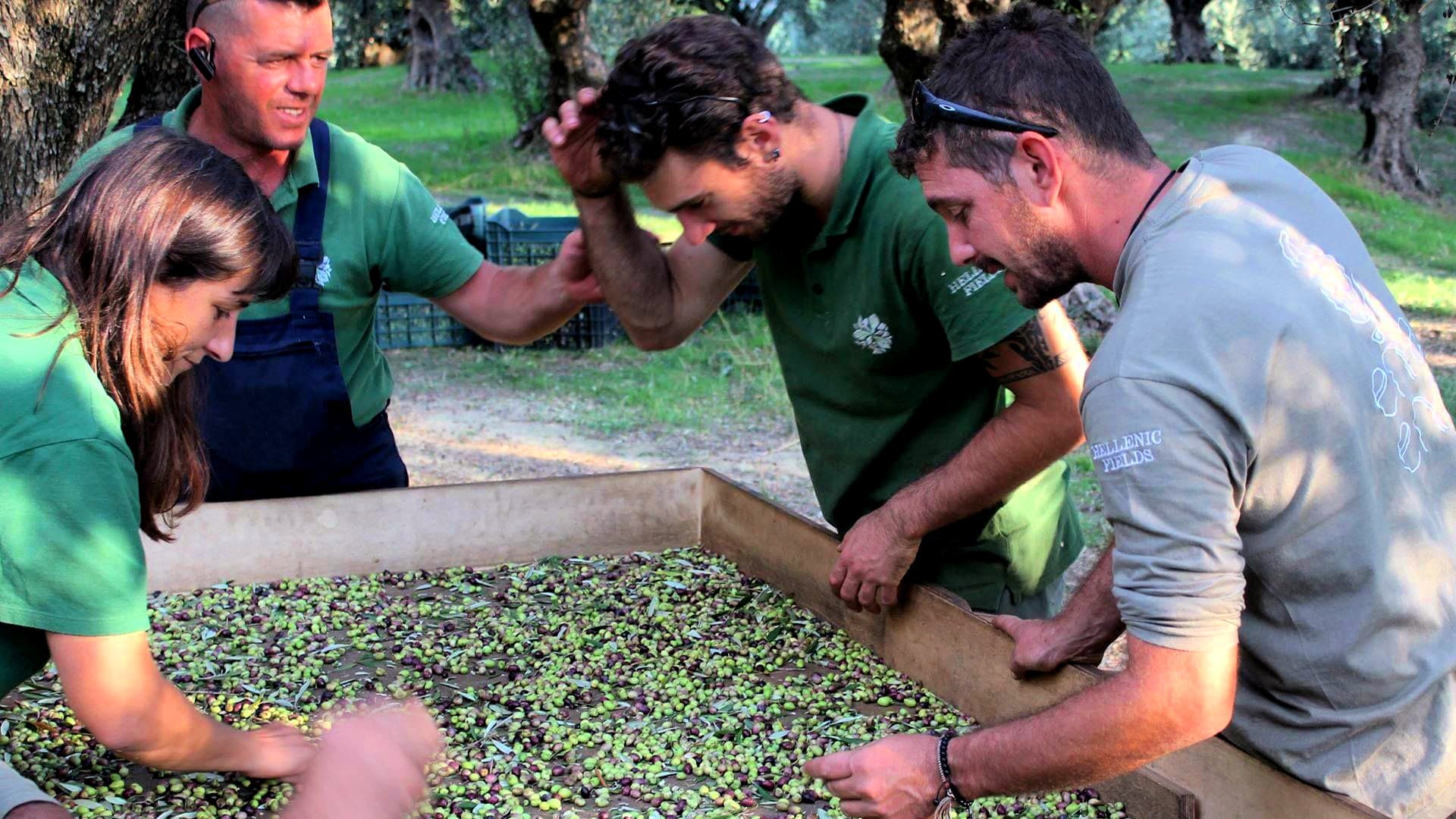
Sorting olives in the groves helps ensure the highest quality extra virgin olive oil. (Photo: Hellenic Fields)
Depending on the olive grove and the fruiting of the trees, a quantity of 1.5 to three tons of olives can be harvested each day from the company’s groves.
In the 2024/25 crop year, however, the prolonged drought that southern Greece experienced in the autumn required the two producers to draw on all their expertise and knowledge in olive cultivation.
“This year, we saw the impact of climate change on our non-irrigated olive trees,” Philippidis and Moforis said. “The thermal stress the trees suffered reached a point where they were even absorbing the moisture from the olive fruits to survive.”
“In addition, harvesting at high temperatures presented challenges in bringing out the complex and distinct aromas that our unique terroir gives to the Koroneiki variety,” they added.
High temperatures during harvest can have a detrimental impact on the quality of olives and the resulting olive oil.
At Hellenic Fields, if atmospheric temperature rises excessively on a harvest day, the olives are cooled, making them more suitable for the milling process that takes place later on the same day.
Immediately storing the freshly produced olive oil after milling is a key final stage of the production process at Hellenic Fields.
“To preserve its character, our olive oil is stored in temperature-controlled stainless steel tanks with added nitrogen, protecting it from oxidative damage and locking in its natural freshness and aroma until bottling,” the owners said.
The stored olive oil is then filtered and bottled to order in numbered bottles, ensuring easy traceability.
Hellenic Fields exports its extra virgin olive oil, with a focus on Asian countries, Australia, Scandinavia and the United States.
In Greece, the company specializes in supplying its oil to high-end gastronomic establishments, such as select restaurants and hotels, as well as to retailers of premium agricultural products.
Hellenic Fields is deeply rooted in Greece’s rich agricultural heritage. The NYIOOC awards the company has won over the years attest to their expertise in crafting high-end olive oil and signal the product’s quality to consumers.
“At the heart of our vision at Hellenic Fields lies Ena Ena,” Philippidis and Moforis said. “Each bottle is a story of place, people and purpose, meticulously harvested and crafted to preserve its nutritional and organoleptic richness.”
“The New York accolades are a clear indication of the quality of our olive oil and the labor we put into olive cultivation,” the Hellenic Fields owners concluded.
Share this article


